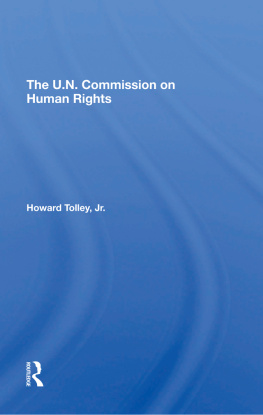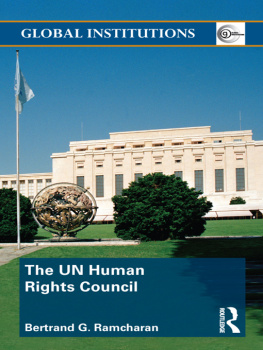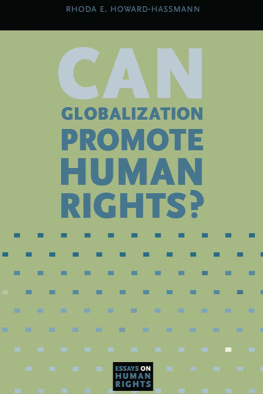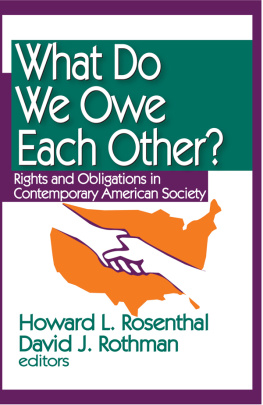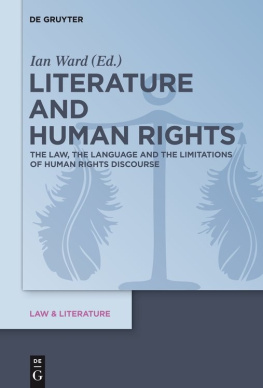The U.N. Commission on Human Rights
About the Book and Author
In 1946, the United Nations Commission on Human Rights became the first international body empowered to promote global human rights. During its first twenty years, the Commission established most of the contemporary standards of human rights. Increased social awareness in the 1960s enabled the Commission to respond to specific complaints from individuals and nongovernmental organizations and to pressure offending governments by using various measures that ranged from exhortation and mediation to sanctions designed to isolate violators. These enforcement activities have increased the Commission's visibility and have dramatically transformed its operation.
Dr. Tolley's thematic history of the Commission offers important insights into states' political conduct in international human rights organizations, the evolving legal and institutional means of preventing human rights violations, and the difficulties encountered when an intergovernmental body is pressed to provide impartial protection to citizens against abuse by their own government.
Howard Tolley, Jr., is associate professor of political science at the University of Cincinnati and a fellow of the Urban Morgan Institute for Human Rights.
Sponsored by the
Urban Morgan Institute for Human Rights
College of Law, University of Cincinnati
The U.N. Commission on Human Rights
Howard Tolley, Jr.
First published 1987 by Westview Press
Published 2019 by Routledge
52 Vanderbilt Avenue, New York, NY 10017
2 Park Square, Milton Park, Abingdon, Oxon OX14 4RN
Routledge is an imprint of the Taylor & Francis Group, an informa business
Copyright 1987 by Howard Tolley, Jr.
All rights reserved. No part of this book may be reprinted or reproduced or utilised in any form or by any electronic, mechanical, or other means, now known or hereafter invented, including photocopying and recording, or in any information storage or retrieval system, without permission in writing from the publishers.
Notice:
Product or corporate names may be trademarks or registered trademarks, and are used only for identification and explanation without intent to infringe.
Library of Congress Cataloging-in-Publication Data
Tolley, Howard.
The U.N. Commission on Human Rights.
Bibliography: p.
Includes index.
1. United Nations. Commission on Human Rights.
I. Title. II. Title: UN Commission on Human Rights.
JC571.T66 1987 341.4'81 86-32580
ISBN 13: 978-0-367-29686-5 (hbk)
To our family
After centuries of inadequate, piecemeal efforts to protect citizens from abuse by their own governments, in 1946 the international community founded a global human rights institution. The United Nations Commission on Human Rights became the first international body empowered to promote all the human rights of all the world's peoples. The founders assumed that improved respect for human rights would help individuals and would also serve the United Nations' primary peacekeeping goal by eliminating repressive practices which provoked war.
During its first forty years, the Commission has contributed to the inadequate but nevertheless incremental growth of supranational authority capable of scrutinizing practices that had previously been exclusively within governments' sovereign jurisdiction. After two decades spent in fashioning and promoting human rights law, the Commission shifted to enforcement activities, responding to specific complaints against over seventy governments. The process has increased the Commission's visibility and dramatically transformed its operation while exacerbating fundamental differences over whether political or economic, individual or collective rights deserve priority. This monograph describes the Commission's historical development from 1947 to 1986 in order to answer several important questions. Can a policymaking organ responsible for drafting international norms successfully perform enforcement activities? Can a political organ composed of government representatives provide impartial and effective protection to citizens against abuse by their own governments? The Commission's history offers significant lessons about states' political conduct in international human rights organizations and about the evolving legal and institutional means to prevent human rights violations.
The introductory chapter identifies the Commission's forerunners and recounts its founding. The following six chapters follow the Commission's evolution through four stages of development distinguished by increased membership and new priorities. describes the Commission's standard-setting and promotional activities in that 1967-1979 period.
examines the parallel development of the Commission's independent agent, the Sub-Commission on Prevention of Discrimination and Protection of Minorities. The concluding chapter evaluates the Commission's impact, impartiality, institutional effectiveness, and future prospects.
Three appendices and a select bibliography provide supplementary references. along with lists giving the identifying symbols for annual reports of both the Commission and Sub-Commission.
English language journals and periodicals listed in the bibliography have frequently examined one session or a significant Commission initiative. Jean Bernard Marie published a comprehensive monograph La Commission des droits de l'Homme de l'O.N.U. in 1974, after which the Commission significantly expanded its implementation activities. This study builds upon prior secondary sources with personal interviews and documentary research to describe, explain, and evaluate the Commission's work through 1986.
Sponsorship and financial support of the Urban Morgan Institute for Human Rights of the University of Cincinnati College of Law permitted eight weeks of field research in Geneva during summer 1982 and attendance at the Commission's 39th to 41st Sessions in the following three years. Two articles based on that research have appeared in the Institute's Human Rights Quarterly published by The Johns Hopkins University Press, which has authorized republication of selected material. A 1985 summer research fellowship from the University of Cincinnati supported the project in its final stages. The author also gratefully acknowledges the cooperation of Secretariat staff at the United Nations Centre for Human Rights and the assistance of Commission representatives, government advisors, and officers of nongovernmental organizations who gave personal interviews.
This study has also benefited from critical reviews by a number of scholars, students, and participants including Professors David Forsythe, Paul G. Lauren, Richard Lillich, David Weissbrodt, and Roger Clark; Morgan Fellows Tom O'Donnell, Fred Woodbridge, and Richard Rosswurm; as well as John Humphrey, Sidney Liskofsky and others who commented on different sections of the manuscript. Diddi Mastrullo provided invaluable editorial assistance in preparing the final text and references for publication. Clerical support from Marie Toland and Nancy Ent appreciably lightened my burden. Professor Bert B. Lockwood, Jr., Director of the Urban Morgan Institute for Human Rights, has provided the indispensable guidance and sponsorship which made the project possible.


